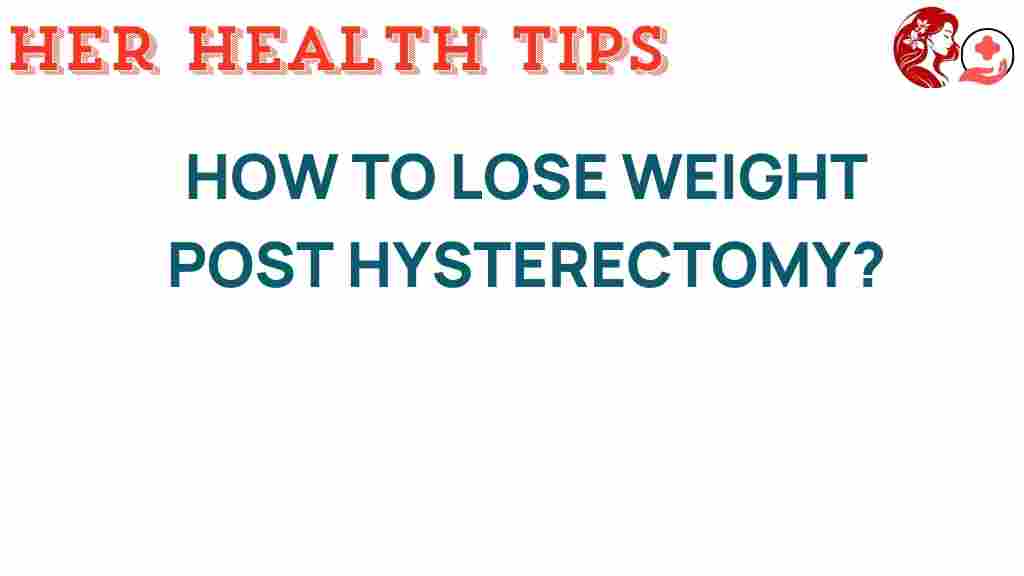Unlocking the Secrets: How to Lose Weight Post Hysterectomy
Undergoing a hysterectomy can be a major turning point in a woman’s life, not just physically but also emotionally and psychologically. After the procedure, many women may find themselves facing challenges related to weight loss, especially due to hormonal changes that can occur during recovery. Understanding how to navigate these changes is essential for effective weight loss and overall women’s health.
This article will explore the nuances of hysterectomy recovery, offering insights into nutrition, fitness, and self-care to facilitate a successful body transformation. We’ll discuss the impact of hormonal fluctuations, provide a step-by-step process for weight loss, share troubleshooting tips, and emphasize the importance of post-operative care.
The Impact of Hysterectomy on Weight Loss
A hysterectomy can lead to significant hormonal changes due to the removal of the uterus and possibly the ovaries. These changes can affect metabolism, appetite, and fat distribution. Understanding these effects is crucial for women aiming for weight loss during their recovery period.
- Metabolism Changes: After surgery, some women may experience a slower metabolism, making it easier to gain weight.
- Hormonal Fluctuations: The removal of ovaries can lead to lower estrogen levels, which can affect body fat distribution.
- Emotional Well-being: Stress and emotional changes post-surgery can lead to overeating or unhealthy eating habits.
Step-by-Step Process for Weight Loss Post-Hysterectomy
Here’s a comprehensive guide to help you embark on your weight loss journey after hysterectomy:
1. Prioritize Post-Operative Care
After surgery, your body needs time to heal. It’s essential to follow your doctor’s recommendations regarding activity levels, medications, and follow-up appointments. Prioritizing post-operative care will lay the groundwork for a successful weight loss journey.
2. Focus on Nutrition
Nutrition plays a critical role in weight loss and recovery. Here are key points to consider:
- Balanced Diet: Aim for a diet rich in whole foods, including fruits, vegetables, whole grains, lean proteins, and healthy fats.
- Hydration: Drink plenty of water to stay hydrated, which is vital for recovery and overall health.
- Portion Control: Be mindful of portion sizes to avoid overeating, which can lead to weight gain.
3. Incorporate Fitness Gradually
Once your doctor gives you the green light, start incorporating physical activity into your routine. Here’s how:
- Start Slow: Begin with gentle exercises like walking or stretching to avoid straining your body.
- Strength Training: Once you’re comfortable, include strength training to build muscle, which can help boost metabolism.
- Regularity: Aim for at least 150 minutes of moderate exercise each week.
4. Manage Hormonal Changes
Be proactive in managing hormonal changes that may impact your weight. Consider the following:
- Regular Check-ups: Schedule regular appointments with your healthcare provider to monitor hormone levels.
- Consider Hormone Therapy: If applicable, discuss hormone therapy options with your doctor to alleviate symptoms related to hormonal changes.
5. Embrace Self-Care
Taking care of your mental and emotional health is just as important as physical health. Here are self-care strategies:
- Mindfulness and Stress Management: Practice mindfulness techniques like meditation or yoga to reduce stress.
- Support Systems: Engage with support groups or talk to friends and family about your journey.
- Journaling: Document your feelings and progress to stay motivated and aware of your mental state.
Troubleshooting Common Weight Loss Challenges
Despite your best efforts, you may encounter challenges during your weight loss journey. Here are some common issues and solutions:
1. Weight Loss Plateau
If you find yourself stuck at a certain weight, consider the following:
- Reassess Your Caloric Intake: Ensure you are still in a caloric deficit. Your needs may change as you lose weight.
- Change Up Your Routine: Introduce new exercises or change the intensity of your workouts to stimulate progress.
2. Emotional Eating
Emotional or stress-related eating can hinder your progress. Here are tips to manage this:
- Identify Triggers: Keep a food diary to identify patterns in your eating habits.
- Healthy Alternatives: Replace unhealthy snacks with healthier options like fruits or nuts.
3. Hormonal Imbalances
Hormonal changes can affect weight loss. To manage this:
- Consult a Specialist: If you suspect hormonal imbalances, seek help from an endocrinologist.
- Balanced Nutrition: Ensure your diet includes enough nutrients that support hormonal health.
Conclusion
Losing weight post-hysterectomy can be a complex journey influenced by various factors, including hormonal changes and emotional well-being. However, with the right approach to nutrition, fitness, and self-care, you can successfully navigate this transition and achieve your desired body transformation.
Focus on gradual changes, prioritize your health during recovery, and don’t hesitate to seek support from healthcare professionals. Remember, every woman’s experience is unique, and it’s essential to listen to your body and adjust your strategies accordingly.
For more resources on women’s health and post-operative care, visit this link. If you’re looking for support and community, consider joining forums or groups where other women share their experiences and tips.
This article is in the category Wellness and created by HerHealthTips Team
